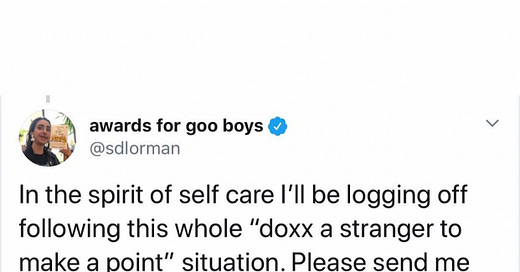I went to not one but TWO liberal arts colleges—so trust me when I say I am extremely, tortuously, versed in the mechanics of “using therapy-sounding language to justify absolute interpersonal atrocities.”
This is in response to a piece I loved today by Rebecca Fishbein which touches on just that, called Is Therapy Speak Making Us Selfish?
The piece explores a mentality that you’ve likely encountered, whether through viral content (I’m at Capacity) or in your own life. It starts with this story (block texts below are direct quotes from article) about a young woman named Anna who,
was dumped by a longtime friend over text. While making plans to meet up, the friend pivoted and told Anna she wanted to end their five-year friendship. When Anna asked if it was something she did, her friend told her she wasn’t comfortable answering, and that there was no more room for discussion. “I’m in a place where I’m trying to honor my needs and act in alignment with what feels right within the scope of my life, and I’m afraid our friendship doesn’t seem to fit in that framework,” the friend wrote. “I can no longer hold the emotional space you’ve wanted me to, and think the support you need is beyond the scope of what I can offer.”
The article continues:
In recent years, therapy concepts like self-care and boundary-setting have shown up everywhere online, with Instagram accounts and other social media communities sharing mantras and advice advocating for self-actualization. TikTok therapists like Nadia Addesi and TherapyJeff offer tips for struggling with anxiety, self-esteem, and people-pleasing. “Therapy speak” — prescriptive language describing certain psychological concepts and behaviors — can be found everywhere from group chats to dating apps. Now, we have more language to advocate for ourselves and our needs, whether it be canceling plans when we feel overwhelmed or ending relationships that no longer serve us.
I have been in therapy for a long time and I will say: the therapy speak of viral fame is not what I’m getting from therapy.
This supposed therapy speak is what I of scientific mind can only dub as a creature borne in the murky depths of Tumblr, that rose The Blob-like onto Instagram and TikTok, where it found a ripe and fertile breeding ground to proliferate amongst absolute weirdos calling themselves self-help experts to make a name for themselves. I mean—help others. Like and subscribe as self-care, cuties!
I know, I know. I’m being ungenerous here. But I think the spread of this language cannot be separated from the rise of social media platforms and the people who are most successful on them.
I think a basic thing that’s easy to overlook when you’re very online and have become rather accustomed to random people telling you boundary setting is when you dump your friends through PDF or whatever is that, when enough people are liking, commenting, sharing, when you’re seeing this shit everyday, when you’re simply scrolling past even if you don’t believe it, it becomes hard to remember that MAYBE THIS IS NOT NORMAL. MAYBE THIS IS NOT HOW PEOPLE TALK TO EACH OTHER.
But suddenly, it is normal. It’s self care. And to start questioning otherwise is to feel deeply alienated from the people / platforms which perhaps had, at one point or another, helped you feel less alone. And then maybe you’re sending a friend who isn’t really there for you anymore a five-paragraph breakup text about how you no longer have the emotional energy to keep space for them in your life anymore, or something.
Anyways: trying to make the point here that the use of this language cannot be separated from the rise of people who make a living off telling you to use this language, and the platforms by which they spread. We know nuance does not go viral. Which leaves us with inflammatory options, that eventually get circulated around so much they start to feel…fine.
In pursuit of total transparency or“good boundary setting,” this therapy speak is often a flimsy layer over being mean. This is a mean way to treat your friends! If someone is deploying the robotic format to dump a friend because they think it’s the kind thing to do, the person on the receiving end is left with no closure and a profound, often clinical, assessment of their supposed failures. It is the aftermath of these sort of exchanges that I find especially haunting. Breakups of whatever nature suck already. Several block texts about someone’s failure that dresses up as “self-care” for the person sending is…perhaps not necessary? (Have I done this? You bet baby! Have I received them? Also yes!)
(On the most recent season of The Bachelor, the Bachelor (Zach) pulled what I’ve been calling “Cuck Week,” which is that during the fantasy suites week, i.e. where you’re allowed to fuck the remaining contestants, Zach decided he was going to not have sex in order to um. I don’t know. But then he did have sex with one of them, and proceeded to tell all the women involved in excruciating detail what had happened. He self-imposed the cuck week, and then in pursuit of “honesty” made all the women feel like shit. He could have simply not done this. Point being: sometimes all the details are not necessary, and often the empathetic thing to do is to be honest but not needlessly transparent in ways that become haunting for others. I extremely, extremely digress. This has nothing to do with what I’m talking about and I realize I just wanted to talk about Cuck Week tbh.)
Circling back: the proliferation of therapy language, is, to use my own made-up language, an incredibly Good Boy-ian gesture. In the quest to hurt less feelings, or feel like a good communicator, or remain a good person, people are doing DOGSHIT STUFF TO EACH OTHER (quote me on that) and feeling justified, perhaps even…EMPOWERED. It is a hall of mirrors wherein nothing is actually being communicated, and what is said is absolutely empty of empathy. Ironically in the search for a more humane way of communicating, this type of mindset is utterly and totally devoid of humanity.
It reminds me a bit of a piece I wrote about the “Men Should Go to Therapy” meme, and how essentially this was 1) inadequate advice for an inaccessible service and 2) not a panacea for the problems we are trying to solve.
I see the popularity of this therapy speak as a symptom of isolation (more on that later, i.e., next book): How much willingness to take direction from strangers online might come from a deep and profound sense of isolation? Which unfortunately is then reinforced by advice which totally alienates you from other people. Would access to actual therapy improve this? I don't know, but it seems an easy jump to make that if people did have more structural supports needed to take care of themselves the type of “self-care” popularized by social media wouldn't seem as promising.
Anyways read the whole article, it’s good. If I am not making sense: it’s the Covid. I am left thinking too of how this sort of language is not just relegated to the friendly, familial, or romantic realms: it seems to be creeping increasingly into things like work and branding, etc. I’m trying and failing to find a tweet with an email from a landlord that was really using this therapy language. SO. Much to think about.
Shelby is watching Yellowjackets update:
Well. That’s all I have to say about that.
Also in my newsletter last week, while expressing my fears that Yellowjackets would “pull a Lost,” I mistakenly claimed that The Leftovers has 2 seasons. In fact it has 3.
Reading:
Positively BEGGING You: Spammed with demands from the Democrats
Maybe We Should Believe Trans Kids Instead of the Assholes Who Hate Them
Film Workers Say a Gun on the Hip of a New York City Film Producer Led to a Strike
Reading: Book Edition
Reading this absolutely wild sci-fi called “A Fire Upon the Deep” By Vernor Vinge. Very weird. Very cool.
I don’t know who told me to read the Gideon the Ninth (gay necromancers) series but. THANKS I LOVE THEM
Break.up by Joanna Walsh
Dog in a Bog:
xoxo
shelby + clem








This so well written and a really good topic at this point of time in the internet. Thank you so much for this!!